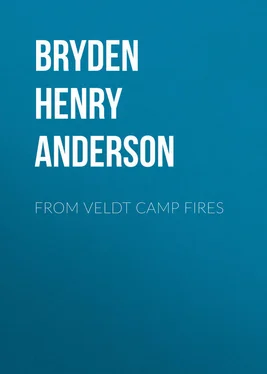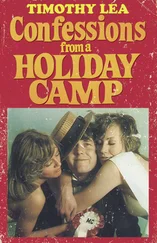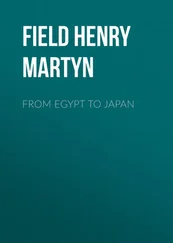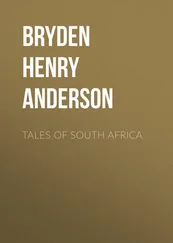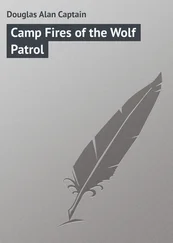Henry Bryden - From Veldt Camp Fires
Здесь есть возможность читать онлайн «Henry Bryden - From Veldt Camp Fires» — ознакомительный отрывок электронной книги совершенно бесплатно, а после прочтения отрывка купить полную версию. В некоторых случаях можно слушать аудио, скачать через торрент в формате fb2 и присутствует краткое содержание. Жанр: foreign_prose, foreign_antique, foreign_language, на английском языке. Описание произведения, (предисловие) а так же отзывы посетителей доступны на портале библиотеки ЛибКат.
- Название:From Veldt Camp Fires
- Автор:
- Жанр:
- Год:неизвестен
- ISBN:нет данных
- Рейтинг книги:3 / 5. Голосов: 1
-
Избранное:Добавить в избранное
- Отзывы:
-
Ваша оценка:
- 60
- 1
- 2
- 3
- 4
- 5
From Veldt Camp Fires: краткое содержание, описание и аннотация
Предлагаем к чтению аннотацию, описание, краткое содержание или предисловие (зависит от того, что написал сам автор книги «From Veldt Camp Fires»). Если вы не нашли необходимую информацию о книге — напишите в комментариях, мы постараемся отыскать её.
From Veldt Camp Fires — читать онлайн ознакомительный отрывок
Ниже представлен текст книги, разбитый по страницам. Система сохранения места последней прочитанной страницы, позволяет с удобством читать онлайн бесплатно книгу «From Veldt Camp Fires», без необходимости каждый раз заново искать на чём Вы остановились. Поставьте закладку, и сможете в любой момент перейти на страницу, на которой закончили чтение.
Интервал:
Закладка:
“We had now to make a détour to the right, away from the river, and for great part of a day picked our painful footsteps over a rough and semi-mountainous country. Towards evening, we emerged upon a dreary and interminable waste that lay outstretched before us, its far horizon barred in the dim distance by towering mountains, through which we should presently have to force our passage. That evening we outspanned in a howling wilderness of loose and scorching sand, upon which scarcely a bush or shrub found subsistence. After a night not too comfortable and broken by some hyenas that prowled restlessly about, we were up betimes next morning. As soon as the oxen were inspanned and ready to move forward for the mountains to which Klaas had directed our course, I rode off for a low kopje that rose from the plain away in the distance hoping to see game beyond. I was not disappointed; a small troop of hartebeest was grazing about half a mile off, and by dint of a little manoeuvring with my Hottentot after-rider, whom I despatched on a détour, I managed to cut across the herd and knocked over a fat cow at forty yards. We soon had her skinned, and taking the best of the meat, rode on for the waggon. Again we had an exhausting trek over a burning sandy plain; the heat of this day was something terrible. I have had some baddish journeys in the doorst-land on the way to the great lake, but this was, if possible, worse. Towards four o’clock the oxen were ready to sink in their yokes, their lowing was most distressing, and as the water was now nearly at an end, and we might not reach a permanent supply for another day, nothing could be done to alleviate their sufferings. At nightfall, more dead than alive, we outspanned beneath the loom of a gigantic mountain range, whose recesses we were to pierce on the following morning. Half a day beyond this barrier lay the valley of diamonds, as Klaas whispered to me after supper that night, with gleaming excited eyes; for, noticing my growing keenness, he, too, was becoming imbued with something of my expectancy.
“That night, as we lay under the mountain, was one of the most stifling I ever endured in South Africa, where, on the high table-lands of the interior, nights are usually cool and refreshing. Even the moist heat of the Zambesi valley was not more trying than this torrid, empty desert. The ovenlike heat, cast up all day from the sandy plain, seemed to be returned at night by these sun-scorched rocks with redoubled intensity. Waterless, we lay sweltering in our misery, with blackened tongues and parched and cracking lips. The oxen seemed almost like dead things. Often have I inwardly thanked Pringle, the poet, of South Africa, for his sweet and touching verse, written with the love of this strange wild land deep in him, for his striking descriptions of its beauties and its fauna. As I lay panting that night, cursing my luck and the folly that brought me thither, I lit a lantern and opened his glowing pages. What were almost the first lines to greet my gaze? These!
“A region of emptiness, howling and drear,
Which man hath abandoned, from famine and fear,
Which the snake and the lizard inhabit alone,
With the twilight bat from the yawning stone;
Where grass nor herb nor shrub takes root,
Save poisonous thorns that pierce the foot;
And here, while the night-winds around me sigh,
And the stars burn bright in the midnight sky,
As I sit apart by the desert stone,
Like Elijah at Horeb’s cave alone,
‘A still small voice’ comes through the wild
(Like a father consoling his fretful child),
Which banishes bitterness, wrath and fear,
Saying, ‘Man is distant, but God is near.’
“We hailed, the passage of the mountains next morning with something akin to delight; anything to banish the monotony of these last two days of burning toil. We were up as the morning star flashed above the earth-line. We drank the remaining water, which afforded barely half a pint each to the men, none for the oxen and horses. With difficulty the poor oxen, already, in this short space, gaunt and enfeebled from the heat and for lack of food and drink, were forced up into their yokes. Klaas, as the only one of us who knew the country, directed our movements, and with hoarse shouts, and re-echoing cracks from the mighty waggon-whip, slowly our caravan was set in motion. Our entrance to the mountains was effected through a narrow and extremely difficult poort (pass), strewn with huge boulders and overgrown with brush and underwood that often barred the way and rendered Stoppages frequent. After about a mile, the kloof into which this poort debouched suddenly narrowed and turned left-handed at right angles to our course. Accompanied by Klaas, I walked down it, and was soon convinced by the little Bushman that our passage that way was ended. As Klaas had warned me, our only way through and out of the mountains now lay in taking, with our waggons, to the steep and broken hill sides, a proceeding not only perilous, but apparently all but impossible. Yet the thing had to be done, and we at once set the spent oxen in motion and faced the ascent obliquely. After consultation with Klaas, I got out some ropes, which I had fastened to the uppermost side of the waggon, while some stout long poles, which I had had previously cut for such an emergency while outspanned at the Orange River, served to prop up our lumbering vehicle from the lower side. Slowly and wearily, and yet, withal, with a sort of dogged stubbornness, the poor oxen toiled on, half-hour after half-hour, urged by our shouts, by the cruel waggon-whip, mercilessly plied, and the terrible after-ox sjambok. Many times it seemed, as our cumbrous desert ship crashed across a boulder or down a stair-like terrace of rock, that it must inevitably topple over and roll crashing to the bottom; but our guy-ropes and the supporting poles saved us again and again.
“I had fastened one of the ropes with a stout band of leather round the chest of my hunting horse; the other two ropes were held by the strongest of my servants and myself, while two other men held the poles against the lower side of the waggon as they stood down hill below it. My old horse, guided by a Bechuana boy, as usual, proved himself as sensible as any Christian, knew exactly what he had to do, and, when we came to crucial points and the waggon shivered as it were upon empty space, he and my Kaffir and I tugged away, while the fellows below shoved with might and main. And so time after time we averted a catastrophe, so dire that I shuddered to think of it; for in some places, if the waggon had gone, the wreck must have been irreparable and the yoked oxen hurled with it in a broken and mangled heap to the bottom far below us. Well, occasionally halting for a blow, long hours of the most distressing labour I ever experienced were at last got through; we had surmounted and left behind the first huge mountain-side, had plunged into a valley, had passed obliquely over the shoulder of another great mountain, and now halted in a deep and hollow kloof lying below a singular flat-topped mountain, conical in shape, that stretched across our onward path. This mountain was flanked on either hand, as we fronted it, by yawning cliffs, and was only approachable from this one aspect. Here we outspanned for a final rest before completing our work, if to complete it were possible. Shading my eyes from the fierce sunlight, I looked upward at the long slope of mountain, broken here and there, and occasionally shaggy with bush; over all the fierce atmosphere quivered, seething and dancing in the sun-blaze. I looked again with doubt and dismay at the gasping oxen, many of them lying foundered and almost dead from thirst and fatigue, and my spirits, usually brisk and unflagging, sank below zero. Klaas had told me previously of a most wonderful pool of water that lay on the crown of a mountain where we should outspan finally before entering upon the portals of the diamond valley. Now he came to me and said, pointing upwards, ‘Sieur, de sweet water lies yonder op de berg. It is a beautiful pool, such as ye never saw the like of; if we reach it we are saved and the oxen will soon get round again; ye must get them up somehow, even without the waggon.’
Читать дальшеИнтервал:
Закладка:
Похожие книги на «From Veldt Camp Fires»
Представляем Вашему вниманию похожие книги на «From Veldt Camp Fires» списком для выбора. Мы отобрали схожую по названию и смыслу литературу в надежде предоставить читателям больше вариантов отыскать новые, интересные, ещё непрочитанные произведения.
Обсуждение, отзывы о книге «From Veldt Camp Fires» и просто собственные мнения читателей. Оставьте ваши комментарии, напишите, что Вы думаете о произведении, его смысле или главных героях. Укажите что конкретно понравилось, а что нет, и почему Вы так считаете.
